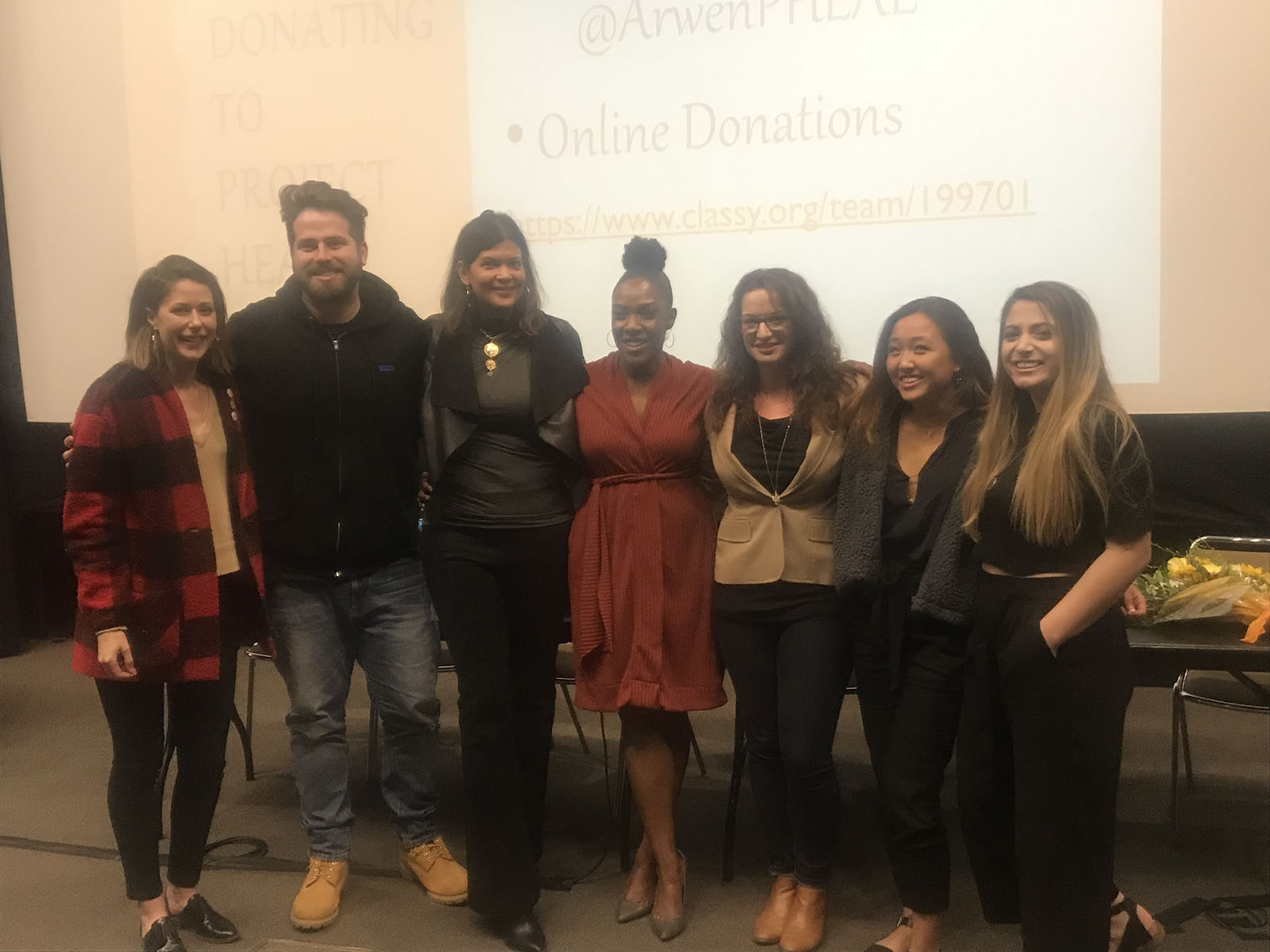Panel members discuss ongoing experiences recovering from eating disorders

Six speakers, including one UCLA student, talked about their experiences with eating disorders and how they have each approached recovery at an event held by the Body Image Task Force and Project HEAL Tuesday. (Tabatha Lewis/Daily Bruin)
By Tabatha Lewis-Simó
Feb. 27, 2019 12:10 a.m.
This post was updated Feb. 28 at 3:59 p.m.
Elena Eu said recovery from her eating disorder wasn’t a finish line, but rather an ongoing journey at a panel Tuesday night.
“It wasn’t one day where I woke up, and no more eating disorder,” Eu said. “It was about every day making choices, making a choice if I wanted to continue being disordered or wanting to do something different.”
Eu, a third-year psychology student, spoke alongside five other speakers who shared their experiences of dealing with eating disorders at the “National Eating Disorders Awareness Panel.” The panel focused on diversity, aiming to include individuals who are usually left out of conversations about eating disorders, such as people of color and people who identify as men. The event, hosted by the Body Image Task Force and Project HEAL, a nonprofit that fundraises for individuals who need monetary assistance with recovery, was held in honor of National Eating Disorders Awareness week.
Eu said she was diagnosed with anorexia her first year of college. When she told her family about her eating disorder, they told her they thought she could figure it out herself and keep it under control, which she said invalidated her struggles. The desire to show how much pain she was in, rather than to lose weight, became the driving force behind her eating disorder, Eu said.
“I didn’t feel like I had any agency in saying I had an eating disorder until my life was at stake, until it was life-threatening. I think that is so dangerous and that is so frustrating for me now,” Eu said. “Looking back, if I could tell myself freshman year ‘Your pain is seen, you deserve recovery,’ that would have done so much to break the mold of what an eating disorder looks like.”
In her second year of college, Eu received treatment at an inpatient treatment center in Florida, which she said helped her realize she had to prioritize mental health over the academic and social aspects of her life.
Eu said she had originally thought her eating disorder was driven by a desire to be healthy or to look a certain way, but realized it was instead driven by pain and insecurity.
She said this realization led her to perceive recovery not as an end goal to strive for, but as an ongoing journey that required her to make the choice every day to break from or continue her disordered eating habits.
Aida Rodriguez, a comedian and former professional model, said she developed an eating disorder because she felt pressured to be a certain size and weight as a model, but later chose to seek treatment in part because she wanted to be there for her children more than she wanted to continue modeling.
After undergoing treatment and receiving community support, Rodriguez said she learned her disordered eating habits simply reflected her poor self-image.
“I started learning how to properly put things into their proper place. Learning my relationship with food had nothing to do with food and everything to do with how I felt about myself,” Rodriguez said.
She said she had to address her feelings of inadequacy to effectively resolve her eating habits.
“When I started putting those issues together, … I realized I didn’t want to be a model and I also started learning that I am fine the way I am,” Rodriguez said. “My focus became to be healthy as opposed to looking a certain way.”
Rodriguez added that she believes eating disorders are improperly portrayed in the media. She said eating disorders are often seen as posh or related to the fashion industry when, in reality, anyone can suffer from eating disorders regardless of their profession or appearance.
“Eating disorders have a white skinny girl face and it becomes uncomfortable when people look at you because you don’t look like what their idea of eating disorders looks like,” Rodriguez said.
Ryan Sheldon, a blogger and ambassador of the National Eating Disorders Association, said most people could not believe he had an eating disorder because he was male and 6 feet, 4 inches tall.
“I went to Google and looked up ‘men with binge-eating disorder’ and I found nothing,” Sheldon said. “So I looked up ‘men with eating disorder,’ and again I found nothing.”
Sheldon then started a blog and Instagram page to share his experiences with binge-eating. Many people reached out to him about their own eating disorders, which he said is what made posting about his eating disorder worthwhile. He added that people can help destigmatize mental health issues through storytelling.
Sheldon said he had been unable to see anything he liked about his body when asked to stand in front of a mirror by his therapist. However, he learned to appreciate his body through therapy.
He said he used to go down a spiral of feeling worthless whenever he binged. But now, he said, he can leave his feelings at the table with his food when he overeats.
“I’m gonna leave it at the table, meaning, I’m going to leave my feelings about the cheeseburger (I ate) at the table and not carry it throughout the week,” Sheldon said.
The National Eating Disorders Association operates a (800) 931-2237 hotline Monday through Thursday from 9 a.m. to 9 p.m. and Friday from 9 a.m. to 5 p.m. Eastern Standard Time. UCLA Counseling and Psychological Services provides short-term individual therapy, psychiatry, group therapy, planning to help students connect with off-campus services and wellness groups for students seeking eating disorder treatment.

